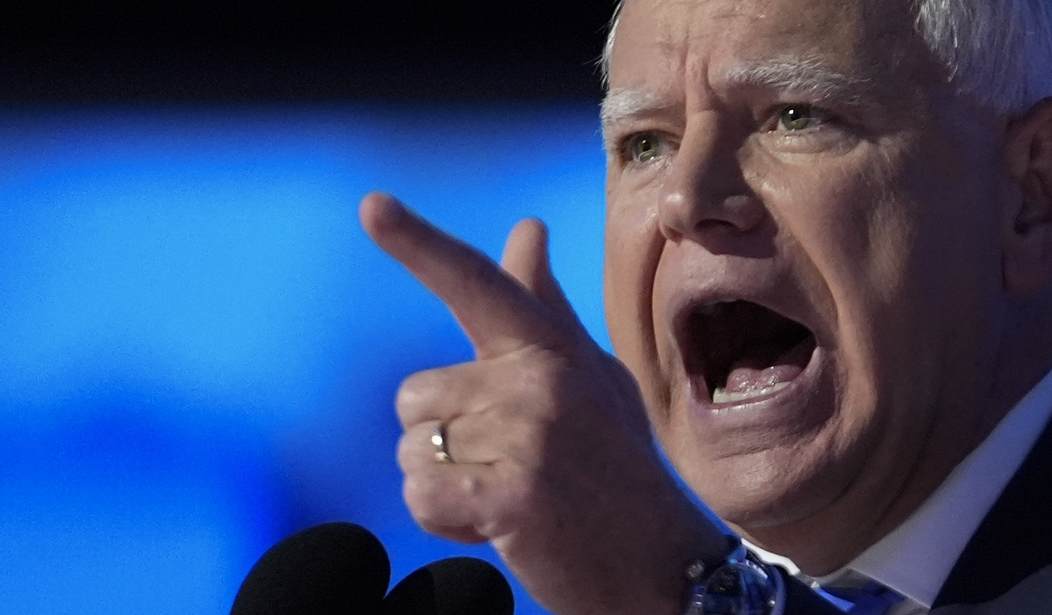"Because in Minnesota, we respect our neighbors and the personal choices they make. And even if we wouldn't make those same choices for ourselves, we've got a golden rule: Mind your own damn business!" Gov. Tim Walz (D-MN) declared during his acceptance speech at the 2024 Democratic National Convention. He was, of course, referring to the killing of unborn babies.
"In Minnesota, we respect our neighbors and the personal choices they make. And even if we wouldn't make those same choices for ourselves, we've got a golden rule: mind your own damn business."
— Townhall.com (@townhallcom) August 22, 2024
Is that why Walz encouraged Minnesotans to snitch on their neighbors during the… pic.twitter.com/NPEIjwY5Z1
Flashback to four years ago when Walz was a COVID-19 tyrant.
As governor of Minnesota, he set up a hotline for residents to report on one another, catching those who committed the cardinal sin of violating his COVID-19 mandates. Walz refused to take down the tattletale line, which alerted authorities to suspicions of non-compliance with Walz's draconian lockdown measures, when asked to do so.
Republican state Senate Majority Leader Paul Gazelka was one of the local leaders publicly calling on Walz to scrap the Big Brother-esque monitoring. "It's not necessary and it's not how Minnesotans want to treat each other. We can all show a bit of kindness to our neighbors as we manage our times and needs differently in the stay at home efforts," Gazelka wrote on X.
Please take this hotline down @GovTimWalz. It's not necessary and it's not how Minnesotans want to treat each other. We can all show a bit of kindness to our neighbors as we manage our times and needs differently in the stay at home efforts.https://t.co/ljYttFaF9m #mnelg
— Paul Gazelka (@paulgazelka) March 31, 2020
Recommended
Walz directly responded to Gazelka's request at a press conference, claiming that the hotline was a tool to "educate" each other about his stay-at-home executive order, according to the Minnesota Reformer.
"We simply want to let people be able to call and let folks know," Walz retorted. "It's for their own good. If we see people that may not be as informed on this, it's an educational piece."
"We're not going to take down a phone number that people can call to keep their families safe," Walz added.
Walz's directive granted him the power to fine or jail purported violators. For failing to abide by Walz's social distancing rules, violations carried a punishment of up to a $1,000 fine or a 90-day jail sentence.
"I urge all Minnesotans to voluntarily comply with this Executive Order," Walz wrote. Anyone who "willfully violate[d]" it was "guilty of a misdemeanor and upon conviction must be punished by a fine not to exceed $1,000 or by imprisonment for not more than 90 days," he ordered.
In early April 2020, since the start of Walz's snitching system, the state received approximately 500 reports of "suspected violations" of Walz's statewide protocols. The top type of reporting was grumblings about businesses that remained open when they "should [have been] closed."
Bars and restaurants that violated Walz's guidelines ordering their closure faced criminal and civil penalties for continuing on-site sale operations. Businesses that didn't comply were reported to the Minnesota Department of Public Safety's Alcohol Gambling Enforcement Division, and law enforcement was dispatched to investigate such complaints.
During a daily pandemic briefing in late March 2020, Walz was displeased with a number of residents refusing to stay home and maintain social distancing after he observed his constituents congregating outside to enjoy the warmer weather. "We're seeing crowds that are a little too big, especially around the lakes," Walz said of the outdoor gatherings.
Walz also actually defended — in fact, he was one of the foremost defenders — the disastrous nursing home policies that sent sick COVID-19 patients to elderly care facilities. A practitioner of this fatal policy, Walz insisted it was "not a mistake" to mingle the infected with such a susceptible population as senior citizens, reported The Park Rapids Enterprise, a Minnesota-based news outlet.
"I think it's important to remember these are folks that went to the hospital, they recovered, but they're still in that mode, and they're going back to their home, and this is where they live," Walz said. "The rest of us, we may self-isolate, but where are we going to put [these] people?"
Claiming that "this was federal guidance," Walz doubled down. "This was what everyone was doing. This was not a mistake. It wasn't like no one thought about this. There was complexity in how you deal with this."
This despite around May 2020, approximately 81 percent (749 fatalities) of the state's COVID-related deaths came from long-term care settings, the highest of any state, according to a research non-profit's analysis.
The policy is now scrubbed from the state government's website.
"Patients with confirmed or suspected COVID-19 who still require transmission-based precautions for COVID-19 can be transferred to congregate living facilities," the policy stipulated, according to an archive acquired via the Wayback Machine, reported Fox News.
"It is the recommendation of [the Minnesota Department of Health] that patients with suspected or confirmed COVID-19 can be discharged when clinically indicated and neither discontinuation of transmission-based precautions nor the establishment of two negative COVID-19 tests is required prior to hospital discharge," the advisory continued.

























Join the conversation as a VIP Member